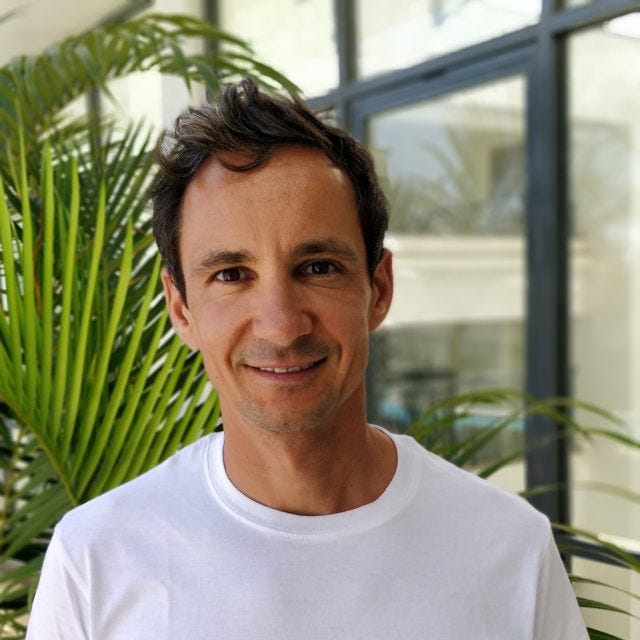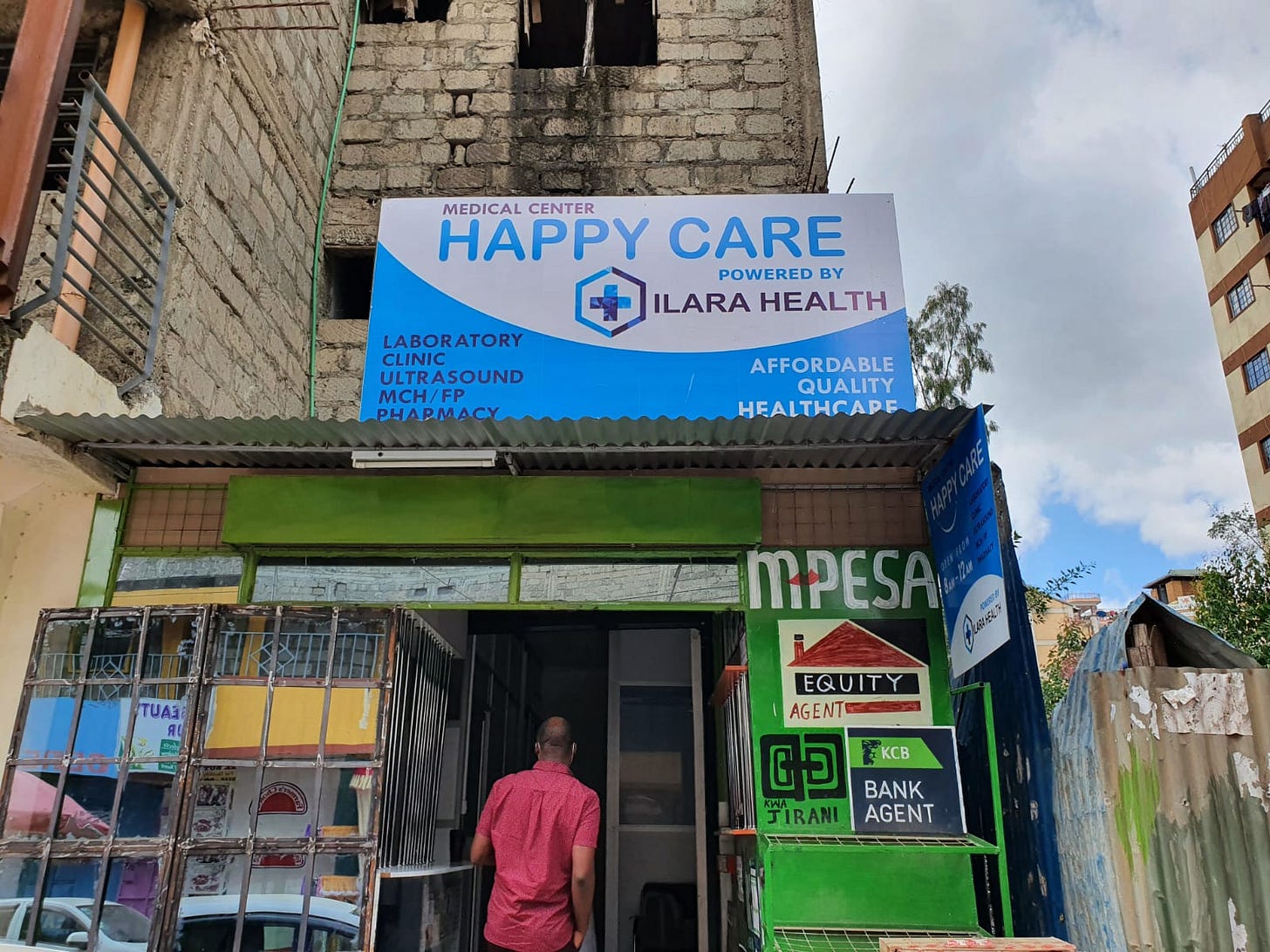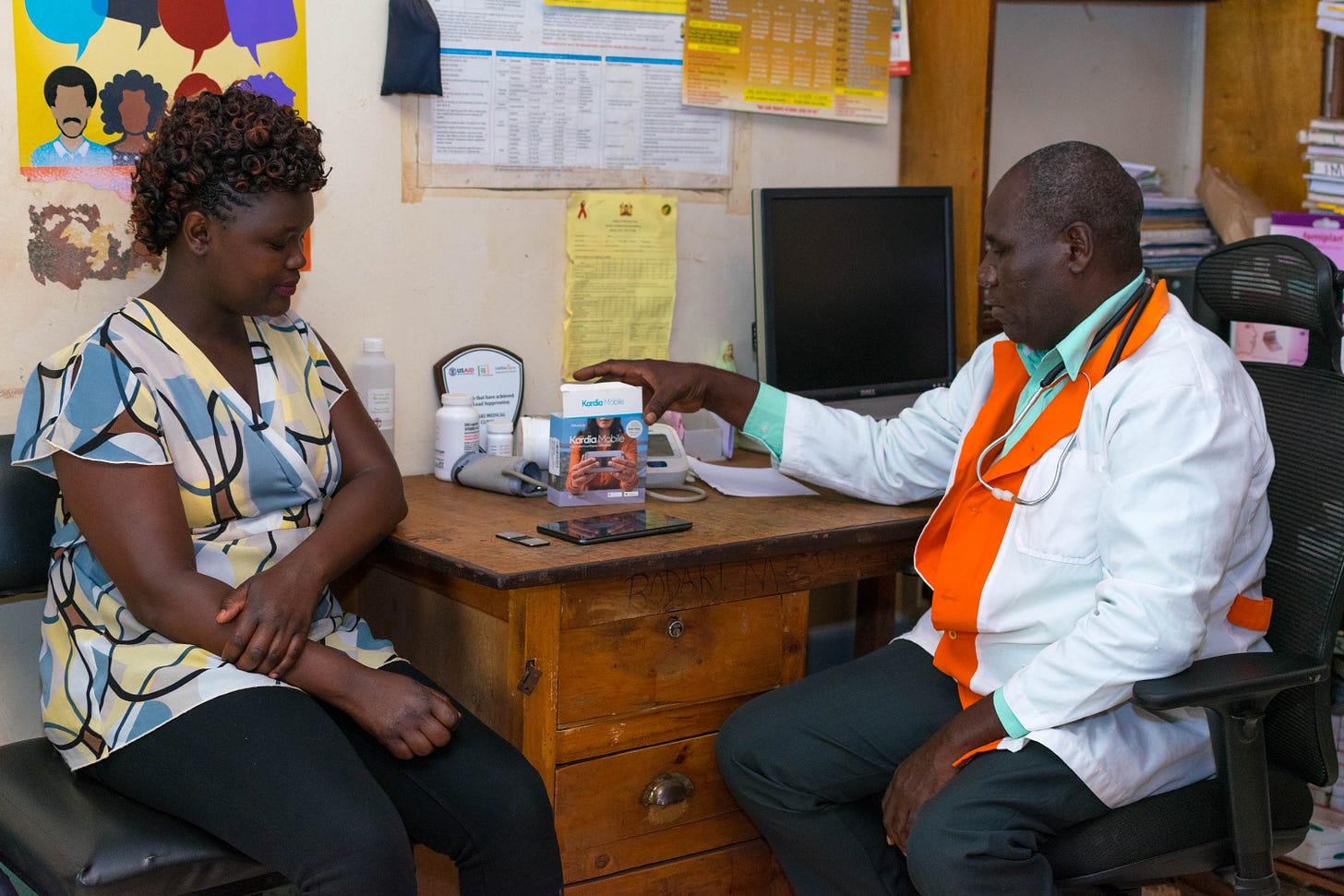Bringing SaaS to healthcare
Ilara Health was founded in Kenya in 2018. This week we caught up with their founder, Emilian Popa to learn more.
What challenge does Ilara Health solve?
Ilara Health exists to make essential diagnostics accessible and affordable across sub-Saharan Africa by providing next-generation diagnostic tools to primary care facilities.
This is done through innovative financing methods, underpinned by a tech platform which stores patient data. This enables providers to access patient histories and the roll-out of patient-facing services like chronic disease management tools.
70% of medical decisions require some form of diagnosis, but as little as 3% of healthcare spending goes on tests. Across the African continent, people struggle to access affordable, accurate diagnosis at the primary care level, and where services do exist, an estimated 50-70% of people are misdiagnosed.
We see that chronic illness is on the rise. Diabetes in particular is growing faster than any other disease across the continent. Cardiovascular disease related deaths are increasing, and the rates of maternal and infant mortality are devastating. However, these deaths are avoidable with the right diagnostics.
To take maternal health as an example, we see that two thirds of preventable deaths occur in Sub-Saharan Africa, and many deaths can be avoided through access to ultrasound imaging. The reality is, that diagnostic tools are life-saving and critical to reducing this unnecessary loss of life.
What’s the story behind the company?
I am passionate about health, about prevention and early detection, and I’ve applied this into my personal life for many years. I also understand technology and I understand operations in Africa really well, through my past 10 years of company building and investing in Africa.
As a biohacker intensely passionate about longevity, I wanted to bring the latest science to solve the realities of what I see on the ground - the underutilization of diagnostics. That was the catalyst for me to start Ilara Health back in January 2018. The rest is, as we say, history.
What were you doing before founding the company?
I was working at DiGAME, the VC firm I grew for 4 years. Prior to that I built Groupon South Africa and then went to Rocket Internet in Asia, India, Russia, South Africa and Nigeria.
After that I built a multi-category ecommerce venture with Naspers funding. My background in investing and entrepreneurship gave me the foundation to build Ilara Health.
How did you get Ilara Health off the ground?
I went part time at DiGAME to begin building Ilara Health in early 2018, I spent around 6 months ideating around health tech models before structuring the current model.
I made the leap to working on Ilara Health full time in early 2019 and closed out our seed round in June of that year. We’re currently part of the Making More Health Accelerator led by Ashoka and Boehringer Ingelheim, MIT Solve, and Google Accelerator for Startups.
How much money have you raised so far?
Close to $5m in our Series A and seed funding rounds.
What went into building the early stage product?
We conducted a pilot with 1,300 healthcare providers that showed that they wanted to serve their clients with better quality diagnostics, but lack the necessary financial resources and technical skills to do so.
We identified our product mix based on the majority of disease burdens we see in the region, built relationships with suppliers, and tested various pricing, sales and marketing models to reach our target market.
What’s your tech stack?
Our backend is built using a combination of Spring Boot and Kotlin with Node.JS and Express. Our front-end is built using React. Our applications are deployed on Google Cloud Platform one a Kubernetes Cluster running on Google Kubernetes Engine. We also leverage IBM Hyperprotect for our more sensitive personal healthcare data.
Our messaging platform uses Twilio and InfoBip for WhatsApp and SMS to communicate diagnostic results and allow general conversations between the physician and patient.
Where do you currently operate?
We are currently operating in Kenya and plan to expand into new countries in the next year. We are currently considering Uganda, Tanzania, Ethiopia and South Africa.
What’s your business model?
We see our business model as a ‘diagnostics as a service’ model. We partner with diagnostics manufacturers disrupting the traditional diagnostic landscape and bring their tools into our target markets.
We integrate these tools into our tech system, automating patient diagnostic data collection. Finally we deploy the diagnostic tool and software bundle within primary care facilities, and charge monthly "subscription" fees.
What metric do you use to measure success?
We measure our success by the number of providers and primary care facilities in our network. The clinics are the gateway to the millions of patients across sub-Saharan Africa who rely on these facilities for all of their primary care needs.
By working with these facilities, we can improve the quality of care for millions of patients by enabling access to fundamental diagnostic services and we can rapidly scale our patient facing services.
What’s the most useful tool you use in your business?
Our daily management report. It allows me to monitor our progress day by day and steer us in the right direction.
What do you love least about running Ilara Health?
What I do at Ilara Health comes from a deep passion so I can’t say there is something I don’t like about running it. I do however find it difficult to let people go, mainly after we spend a lot of effort and time to train them, but sometimes it’s necessary in order to keep a nimble and fast moving team.
What company do you look to for inspiration and why?
In Africa I look to Sokowatch and Twiga. Globally, I’m inspired by 4Catalyzer, q.bio, Binah.ai, Upgrade labs/Bulletproof (Dave Asprey) and Flockjay.
What’s the most important lesson you’ve learnt so far?
I’ve learned that building a successful venture is very much about the team. Finding the right people, growing them and empowering them is key to success.
What are your views on the African tech ecosystem?
There is huge potential and talent in the African tech ecosystem. Africa is continuing to leapfrog and is finding innovative ways to solve its challenges.
In the News 🚀
🇳🇬 Nigerian fintech startup, Bankly, raised a $2 million seed round from Vault, Plug and Play Ventures, Rising Tide Africa and Chrysalis Capital.
🇿🇼 Farmhut, a Zimbabwean agritech startup has won a $100K grant after scooping up first place in the Hult Prize competition.
🇳🇬 The Nigerian food delivery industry continues to grow as newcomer Olilifood enters the fray. The difference? They are currently focussed on only serving Nigeria’s Delta Region.
👨🏾⚖️ Hague Institute for Innovation of Law‘s (HiiL) Innovating Justice Challenge accelerator programme has opened applications for legaltech startups located across Southern Africa.





